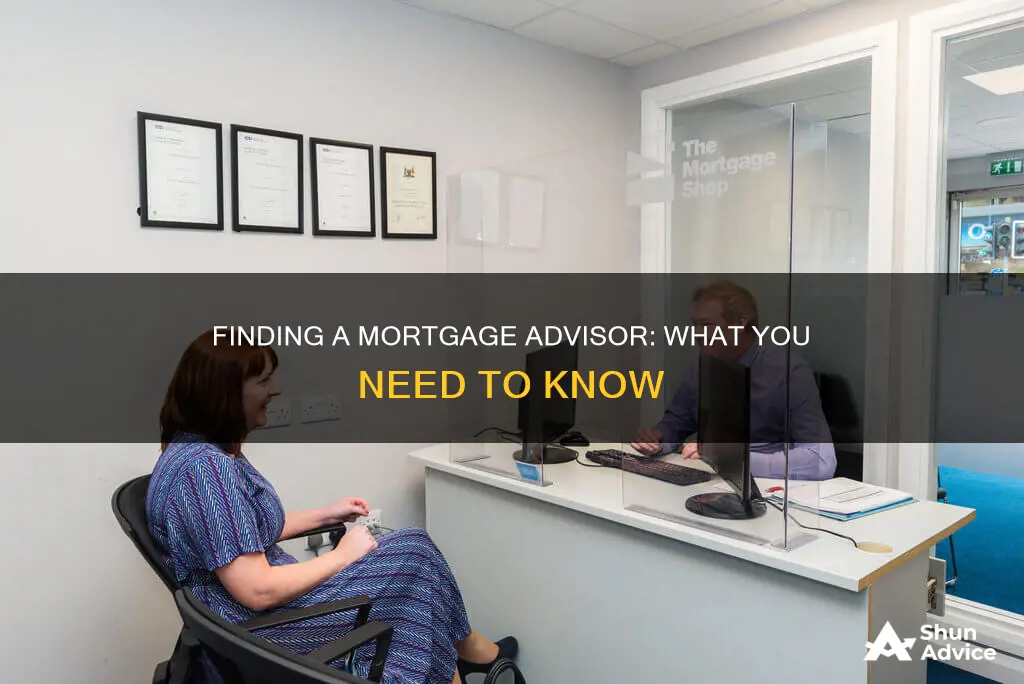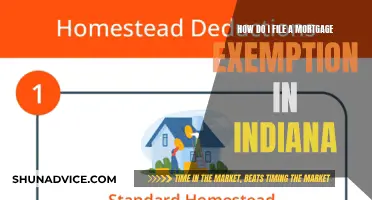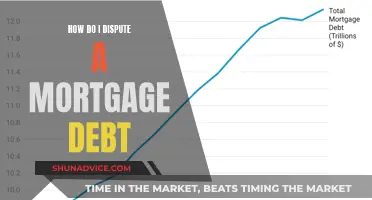
Taking out a mortgage is one of the biggest financial decisions you will make, so it's important to get it right. A mortgage advisor can help you navigate the market to find the best deal for your needs. They can also improve your chances of being accepted for a mortgage and save you time by handling the application process. When choosing a mortgage advisor, it's important to consider their qualifications, fees, and whether they are independent or 'tied' to certain lenders. You can find a mortgage advisor through online services, high street banks, or recommendations from friends.
What You'll Learn

What does a mortgage advisor do?
A mortgage advisor, also known as a mortgage broker, is a professional who can help you navigate the mortgage market and recommend the best deal for your needs. They can either be independent or 'tied' to a mortgage lender. Independent mortgage advisors have a wide knowledge of the mortgages available from different lenders and their lending criteria, whereas tied brokers are restricted to certain deals or providers.
The role of a mortgage advisor is to assess your financial situation and recommend the most suitable mortgage product for your circumstances. They will collect detailed information on your finances, including income streams, assets, employment documentation, debts, expenses, and credit report. They will then help you submit a mortgage application to the lender and secure a competitive rate. Throughout the transaction, the advisor will communicate with both you and the lender.
It is important to note that mortgage advisors are not free. Advisors are typically paid a loan-specific fee for their work, and this fee can be charged directly to you or built into the cost of your loan by the lender. It is recommended to shop around and compare the rates and fees offered by different advisors to find the best fit.
When choosing a mortgage advisor, it is essential to ensure they are qualified and regulated. In the UK, mortgage advisors must have completed a qualification called a Certificate in Mortgage Advice and Practice (CeMAP), which is approved by the Financial Conduct Authority (FCA). You can check if a firm is regulated by searching the FCA register.
Overall, a good mortgage advisor can save you time and effort in the home-buying process by helping you navigate the complex world of mortgages and find the right deal for your needs.
Filing a Mortgage Exemption in Indiana: A Guide
You may want to see also

How to find a good mortgage advisor
Taking out a mortgage is one of the biggest financial commitments you can make, so it's important to find a good mortgage advisor who understands your needs.
A mortgage advisor will review the mortgages available to you based on your personal financial situation and apply for one on your behalf. They can save you time by telling you which lenders are likely to accept you and how to improve your application. They can also speed up the process by dealing with some of the paperwork.
There are a few things to consider when choosing a mortgage advisor. Firstly, are they independent or 'whole of market'? Independent advisors will source mortgages from the whole of the available market, whereas tied brokers are restricted to certain deals or providers. Secondly, do they charge a fee? Some mortgage advisors will charge you directly, while others will be paid by the provider when you take out their mortgage.
You can find a mortgage advisor through a whole-of-market mortgage broker service, which can help you find a qualified advisor in your area. You can also go through high street banks, building societies, and estate agents, who will usually be able to arrange for you to meet with one of their mortgage advisors. Alternatively, you can find an advisor online, and all communications can be done over the phone, email, or video call.
It's a good idea to speak to a few advisors before deciding which one to go with. Some good questions to ask include: Are you independent or tied to certain lenders? Do you charge a fee? Are you qualified?
Discharging Your Mortgage with Westpac: What You Need to Know
You may want to see also

How much does a mortgage advisor cost?
The cost of hiring a mortgage advisor can vary depending on several factors, including the type of advisor, the complexity of the case, and the fee structure. Here is a detailed breakdown of the costs associated with mortgage advisors:
Types of Mortgage Advisors
Mortgage advisors can be classified into two main types: tied or multi-tied brokers and whole-of-market or independent brokers. Tied brokers work with a single lender or a small group of lenders and typically do not charge a fee as they are paid by the lender. On the other hand, independent brokers offer a wider range of options by comparing products from various lenders and usually charge a fee for their services.
Fee Structures
Mortgage advisors can charge fees in different ways, including a flat fee, a fixed-rate fee, an hourly rate, or a combination of these. Flat fees are typically predictable and range from £300 to £600, with an average of around £500. Fixed-rate fees, on the other hand, are usually a percentage of the total mortgage value, often between 0.3% to 1% of the mortgage amount. For example, a 0.75% fee on a £250,000 mortgage would result in a £1,875 charge. Hourly rates can vary, and some advisors may charge a combination of these fees.
Complexity of the Case
The cost of a mortgage advisor may also depend on the complexity of the case. If your situation is relatively straightforward, you may find advisors who charge less than the average of £500. However, if your case is more complex, requiring specialist knowledge or additional work, you can expect to pay higher fees.
Additional Costs
Aside from the advisor's fees, there may be other costs associated with obtaining a mortgage. These include mortgage account fees, which typically range from £100 to £300, and property valuation fees, which can be between £150 and £1,500 depending on the property's value.
Free Alternatives
It is worth noting that some mortgage advisors do not charge any fees. These advisors earn a commission from the lender, typically a percentage of the mortgage amount. While this can reduce upfront costs, it may result in a less specialised or personalised service compared to fee-paying advisors. Online mortgage advisors are another free alternative, providing a convenient way to compare mortgages and find deals through apps or websites.
In conclusion, the cost of a mortgage advisor can vary significantly depending on the type of advisor, the fee structure, and the complexity of the case. It is essential to understand the pricing structure and any additional costs before engaging the services of a mortgage advisor to ensure you are getting the best value for your money.
Comparing Mortgage Offers: What You Need to Know
You may want to see also

What questions should I ask a mortgage advisor?
When it comes to mortgages, it's important to ask questions to ensure you get the best deal for your needs. Here are some key questions to ask a mortgage advisor:
Understanding the Basics
- Are you a whole-of-market or independent broker? This is important as independent brokers can access all lenders and products in the market, whereas tied brokers are restricted to certain deals or providers.
- Are you qualified? A good mortgage advisor should hold a Certificate in Mortgage Advice and Practice (CeMAP) approved by the Financial Conduct Authority (FCA).
- Are you regulated? Check if the advisor or their firm is regulated by the FCA to ensure a certain standard of advice and protection for you.
- Do you charge a fee? Understand the cost structure, whether it's a flat fee, hourly rate, or a percentage. Some advisors may be paid by the provider, so clarify this upfront.
Assessing Your Options
- Given my financial situation, how much can I borrow, and what types of mortgages are suitable for me? A good advisor will consider your earnings, outgoings, deposit, and affordability to recommend the best option.
- What are the potential restrictions on my mortgage? Ask about any limitations on the properties you can buy, such as no motor homes or condos.
- What is the interest rate, and how often is it adjusted? Understand the payment interest rate and the annual percentage rate (APR) to know the basis of your monthly payments.
- Are there any additional fees or penalties? Discuss other costs like mortgage arrangement and valuation fees, origination fees, and prepayment penalties if you sell your home or refinance. Ask about early repayment charges if you plan to pay off the mortgage early.
- What are my options for down payments? Understand the minimum down payment required and explore any available assistance programs for first-time homebuyers.
Additional Services
- Can you help with finding insurance? Some advisors may assist in locating life or home insurance products alongside your mortgage.
- What documentation do you need from me? Provide the necessary documents, such as payslips and proof of identity, to expedite your mortgage application process.
- How long will the process take? Get an estimate of the timeline so you can manage your expectations and plan accordingly.
Remember, it's crucial to feel comfortable with the mortgage advisor and trust their expertise. Don't hesitate to ask clarifying questions and seek advice that aligns with your financial goals and circumstances.
Claiming PPI on Your Nationwide Mortgage: A Guide
You may want to see also

What are the benefits of using a mortgage advisor?
Getting a mortgage is one of the most important financial decisions you will make, so it is crucial to get it right. A mortgage advisor can help you navigate the mortgage market to find the right deal. They are qualified professionals who can save you time and money and provide you with specialist advice.
Mortgage advisors are experts who can assess your financial situation and recommend the best mortgage product for you. They will take the time to get to know your living situation and long-term goals, and give you tailored advice and guidance. They have in-depth knowledge of the industry and will put in the time to find you the best deal available. They will also help you with the paperwork, which can be complicated and time-consuming. They can deal with lenders on your behalf, saving you the hassle of being on hold for hours and chasing applications.
Mortgage advisors are also financial advisors, so they can give you advice that will help with your finances in general, such as ways to improve your credit score. They can also provide guidance on the process of buying a home, such as property surveys, conveyancing, and insurance. They can help you decipher the jargon and data involved in mortgage deals, which can be confusing. They will also have access to exclusive deals and rates that are unavailable to the general public due to their relationships with lenders.
When choosing a mortgage advisor, it is important to find one that you trust and feel comfortable with. Speak to a few advisors before making your decision and ask them questions about their qualifications, fees, and whether they are whole of market or tied to certain lenders.
Adding Your Name to a Mortgage: What You Need to Know
You may want to see also
Frequently asked questions
You can find a mortgage advisor by using an online whole-of-market mortgage broker service, which can help you find a qualified broker in your area. You can also ask your high street bank, building society or estate agent to arrange for you to meet with one of their mortgage advisors.
A mortgage advisor, or broker, is a professional who searches the mortgage market and recommends the best deal for your needs. They can save you time by telling you which lenders are likely to accept you and can speed up the process by dealing with some of the paperwork.
A mortgage advisor can find a deal you can't find on your own and improve your chances of being accepted for a mortgage. They can also save you time and stress by handling everything from searching for a deal to applying and communicating with the lender on your behalf.
It's important to ask a mortgage advisor whether they are whole-of-market or tied to certain lenders. You should also ask whether they are qualified – for mortgage brokers, the most common qualification is the CeMAP (Certificate in Mortgage Advice and Practice).
Some mortgage advisors will charge you directly, while others will be paid by the provider when you take out their mortgage. If you opt for a broker that charges a fee, this will usually be calculated on an hourly or flat-fee basis.







